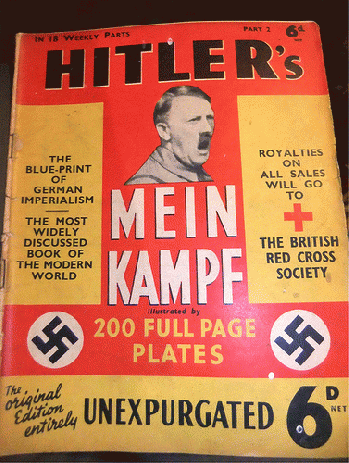Book Review of Gilad Atzmon's "The Wandering Who"
Elias Davidsson, November 16, 2011
A compendium to Mein Kampf
At the
outset, the author, whose main qualities are neither modesty nor civility,
makes sure to inform the reader about his courage and fame as a jazz saxophone
player. His book, The Wandering Who presented as an essay on Jewish
identity politics, is essentially a fraud. The object of the book is to
demonstrate the existence of a global Zionist network, which according to the
author determines U.S. foreign and domestic policy, in short a network whose
purpose and effect is world domination.
The idea of a Zionist organismus or network appears widely throughout the book. The author reveals his desperate efforts to demonstrate the existence of such an organismus and its alleged responsibility for the initiation of wars of aggression when he arbitrarily selects three leading American Jews, Paul Wolfowitz, Scooter Libby and Alan Greenspan, to represent, as it were, this "collective functioning system", or as he prefers to call it "third category brotherhood", an expression that he equates with "racial solidarity" and with "Zionism" (page 21).
Ascribing perfidy to Wolfowitz and his friends, Iraqis are described by the author "as the victims of those third category INFILTRATORS within British and American administrations" (emphasis added). The Bush administration is said to have "complied" with Wolfowitz's political philosophy (page 25), implying that he had the power to coerce the Bush administration, which duly "complied". The author makes it clear that according to him the former two individuals are part of a group of Zionist infiltrators who are responsible for the Iraq war: "THEY planned to rob the Arab oil and to simultaneously 'secure' their beloved Jewish state."(Page 26 -- emphasis added).
The author asks in what appears as contrived innocence: "How is it that America failed to restrain its Wolfowitz's? How is it that America let its foreign policy be shaped by some ruthless Zio[nist]-driven think tanks?"(Page 27). But he does not provide an answer. Had he attempted to answer his own question, he would have had to inquire why the numerous American billionaires and board members of the largest US corporations, including Boeing, Enron, Halliburton, and IBM, did not oppose this alleged Zionist perfidy, if the Zionist plans were contrary to their interests. The inference left unexpressed by the author is, that absent Zionist infiltration, the US ruling circles would not have attacked Iraq (or Panama, or Grenada, or Afghanistan, or Libya) and that US imperialism is actually a Jewish enterprise.
The reader will probably be shocked to discover that the author -- who claims to support Palestinian rights -- actually rejects the Universal Declaration of Human Rights because "it impedes an authentic moral exercise" and because it "fails to provide answers to some different questions that arise as we proceed in time and live through some dramatic changes."(Page 63) He does not explain what he means by these laconic statements and does not appear to base his opposition to racism and to Zionism on any normative ground.
While showing no interest for rights, norms or principles, the author displays a surprising interest in Holocaust Denial: "65 years after the liberation of Auschwitz, we (") should ask for historical evidence and arguments rather than follow a religious narrative that is sustained by political pressure and laws."(Pages 174-175). He does not reveal what should be asked and why. Is the author doubting that Jews were industrially exterminated by the Nazis? Or does he believe that the Jews themselves organized the Holocaust? He also suggests that we ask "Why were the Jews hated" (page 174), leaving the reader to fill in the blanks. And lest we will not heed his advice, the author admonishes us that should we fail to ask the above questions "we will continue to kill in the name of Jewish suffering."(Page 176).
As these glimpses demonstrate, this is a book that deals primarily with the concept of a Jewish (or Zionist) global and omnipotent conspiracy, notwithstanding the author's objection that there is no such conspiracy, because Jewish control is exercised openly. The German elite used successfully the deadly myth of a Jewish world conspiracy to divert anti-capitalist sentiment and prevented thereby a Socialist revolution. The price was paid by millions of deaths. This book might one day serve the same purpose for the U.S. elite, particularly as it is written by a bona fide Jew and Israeli.





